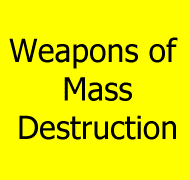



Nassr
Nassr State Enterprise for Mechanical Industries
Nassir State Establishment for Mechanical Industries
Nasser State Enterprise
Before the Gulf War the armaments firm Nassr State Enterprise for Mechanical Industries in Taji, near Baghdad, was viewed as probably involved in the development and production of gas centrifuges as part of the nuclear weapons program. Before the Gulf War Iraq was planning ground-to-ground missiles which would have a range of 1200 to 2000 km, be based on SCUD technology, and use liquid fuel propellant. Project 1729 was assigned to the Nassr State Enterprise, Research and Development Center, Taji-Baghdad.
Nassr was the heart of Iraq's ballistic missile programs and also a critically important player in the nuclear weapons program. Nassr was the key producer of Iraqi missiles and was heavily involved in clandestine nuclear and chemical weapons technology acqusition. The Ababel rocket was manufactured at the Nassr State Enterprise for Mechanical Industries.
Although the relationships between corporate entities and specific operating locations is somewhat obscure, it appears that at least three major facilities are associated with Nassr:
The Al-Arabi Trading Co. was headquartered in Baghdad, and appears to have been under the control of Iraq's main weapons complex, the Nassr State Enterprise for Mechanical Industries. In 1987, Al-Arabi set up its main procurement front in London, a holding company called Technology Development Group or TDG. In 1987, TDG set up a firm called TMG Engineering [TMG] which was the vehicle used to purchase the venerable British machine tool maker Matrix-Churchill Ltd. and its Cleveland, OH, affiliate Matrix-Churchill Corp.
Matrix-Churchill Ltd. [MCL] was the United Kingdom's premier toolmaker and a major supplier of machine tools to arsenals around the world. It has been in existence since 1923 and its two plants in the United Kingdom employed over 700 people. Matrix-Churchill Corp. was the U.S. sales and service affiliate of MCL and it was established in Cleveland, OH, in 1967.
The military uses of Matrix-Churchill machines are the prime reason Iraq was interested in purchasing the company. Acquiring Matrix-Churchill gave Iraq access, not only to the machine tools, but also the computer programming, tooling, and other components needed to make a wide variety of munitions as well as other applications in aerospace and nuclear industries. The purchase could be construed as one big intelligence gathering operation for Iraq.
The Iraqis also set up a project management division within Matrix-Churchill in 1988. The project management division was established to manage the activities of United States companies that won contracts to work in Iraq. The BNL-financed glass fiber factory at Nassr was the project management division's biggest project.
One of the first moves Iraq made when it took over MCC was to abandon its sales and service operations in favor of setting up a procurement and project management division to procure technology for Iraqi arms complexes like Nassr and Hutteen. The procurement division received inquiries from Iraqi entities interested in purchasing United States equipment and services. The department identified sources of equipment and services, and then inspected, evaluated, and selected United States equipment for export to Iraq. Sometimes Matrix-Churchill would purchase the equipment directly from the United States firm and then ship it to Iraq. [source]
Iraq's front company Matrix-Churchill was able to obtain from the United States a glass-fiber factory for the Nassr state enterprise for mechanical industries -- which was Iraq's prime ballistic missile maker and also an integral cog in Iraq's efforts to enrich uranium through the centrifuge method. One of the Iraqi military's highest priorities was carbon- and glass-fiber technology. Western militaries use carbon and glass fibers extensively in nuclear, missile, aerospace programs. These very lightweight fibers, when mixed with the proper ingredients, can protect metal from temperatures up to 3,000 degrees. For example, carbon and glass fibers can be used to insulate pipe in nuclear reactors. Carbon fiber technology is used to make nose cones and other temperature-resistant parts for rockets. When properly fabricated these fibers can also be used to replace metal in many applications. For example, missile casings and many airplane fuselage parts are made with these fibers. These fibers are lighter and more heat resistant than metal. Carbon fibers can also be used to make parts for high-temperature applications such as uranium-enrichment centrifuges. [source]
Sources and Resources
http://www.fas.org/nuke/guide/iraq/agency/nassr.htm
Maintained by Webmaster
Updated Monday, October 09, 2000 7:47:23 PM






